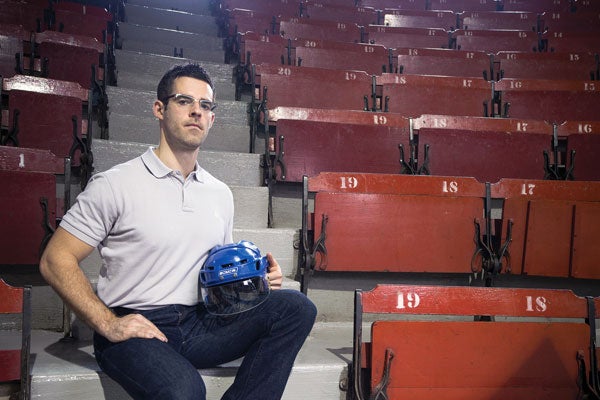
How a concussion started a career
Published: July 30, 2014
It was the second concussion he received as a University of Toronto Varsity Blues hockey player that really piqued Michael Hutchison’s interest.
“Although the injuries were identical in terms of the diagnosis, I felt completely different,” he says. “I wanted to know why.”
An undergraduate research placement eventually turned into graduate school and a postdoctoral position at St. Michael’s Hospital in Toronto. Hutchison is now a research associate in the Faculty of Kinesiology and Physical Education’s Concussion Program.
Focused on concussion in sport, the research program has three areas of focus: prevention, management and education. It works closely with U of T’s David L. MacIntosh Sport Medicine Clinic.
“There is an inherent risk of injury in all sports,” says Hutchison, who is also an assistant coach for the Varsity Blues men’s hockey team. “But unlike a sprain, concussion is a brain injury that affects thinking and emotions, for which there is no predictable recovery pattern.”
Hutchison’s PhD research examined how concussions occur in professional hockey and involved the National Hockey League (NHL), the NHL Players’ Association and hundreds of hours of video. It also informed an NHL rule change, which he finds gratifying. “From a research perspective, you hope your work will translate into policy,” he says. More recent work from Hutchison’s time at St. Michael’s included a thorough examination of “knockouts” (head trauma) in Mixed Martial Arts fighting.
In his current role as a research associate, Hutchison devotes his time to research and is removed from the administrative and teaching responsibilities that come with being a professor. A PhD is required for the job, and some postdoctoral work is usually necessary to attain the skills for the role, he says.
Focusing entirely on research means Hutchison can develop a program specific to his interests while further honing his abilities and increasing his knowledge. He also collaborates with professors in the faculty to develop research and funding opportunities.
He says that as a research associate he’s been provided with a unique opportunity to develop a better rehabilitative model for concussion in the MacIntosh Clinic, where he is the director of the concussion program.
“The goal is to increase and improve the management and rehabilitation of the patients we treat and opportunities for research,” he says. “This position allowed me to help build and refine the program from an administrative and management perspective.”
Hutchison’s goal is continued involvement with the concussion program, and a professorship. “My passion is academia and research, and it’s unique to have a clinic here. Right now I have the best of both worlds.”
This article originally appeared in the magazine Edge, published by U of T's Office of the Vice-President, Research & Innovation. (Read more articles from Edge online.)



